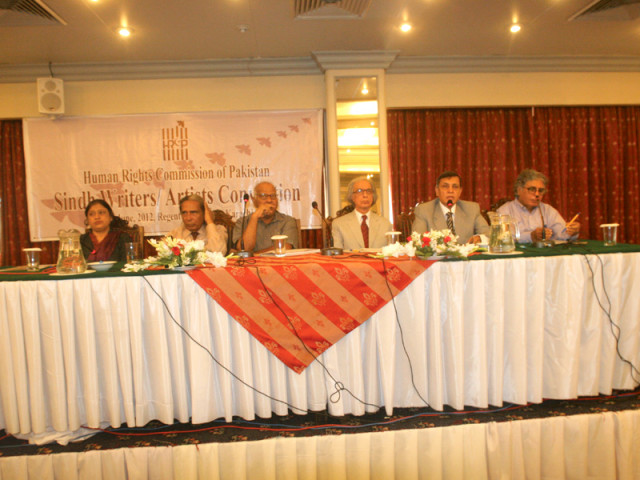Whose culture is it anyway?: ‘Sell your art and your words, write as if you’re making an honest day’s living’
Dadupoto accuses artists and intellectuals of being yes-men for the establishment.

Despite the insistence of those in this country who lambast the youth by telling them that “this is not our culture, this is Hindu culture”, culture is not static nor is it authentic, says art critic Nilofer Farrukh.
Culture, according to Farrukh, is a transformation and is a force for change. She was the keynote speaker at a session titled ‘Culture and the Challenges of the age’. Farrukh echoed a contention backed by many of Pakistan’s artists, that General Ziaul Haq bears responsibility for the destruction of our culture which was already complicated, trying to define itself outside the post-colonialist narrative.
She said that the colonials used to study their subjects as ‘specimens’ and then deconstruct them, only to reconstruct them within their colonial narrative and then telling their subjects “who they are”. She added that as a result, when Pakistanis’ tried to reconstruct their culture after Partition, it was stunted by Zia’s doctrine of jihad and divisive politics from which it has never fully recovered.
“We don’t even know how much Pakistan used to trade with Genoa,” she said. “So much from that era has been excavated and the evidence of the cultural exchange exists which coincides with the time of the Renaissance. Ideas from this part of the world could have actually helped to shape the Renaissance.”
For Farrukh, culture is made of layers and these include religion and tradition that have been a part of the land make up Pakistan’s culture and we should take pride in this fact. For the wealth of pessimism in her talk there was also some optimism as she pointed out the efforts of Sheema Kermani and Madeeha Gauhar for restoring the place of performing arts in Pakistan’s culture despite efforts to stamp it out.
After the informative yet relatively staid talk by Farrukh, famed artist Abdul Fateh Daudpoto approached the stage like he had been biting his tongue since the beginning of the day.
“Man is a social animal, a working animal and then after that we develop into civilisation,” said Daudpoto. “The biggest illness is culture and its biggest tool is language which has corrupted more than anything else!”
According to Daudpoto, artists and intellectuals in Pakistan have always been “yes-men” for the establishment even calling out Sadequain citing his work for Pakistan International Airlines. “Nobody salutes an establishment’s yes-man. An inkaari though is saluted even after he has left this world,” said Daudpoto after stating that 99 per cent of Pakistani artists and intellectuals are the bourgeoisie who, “speak so sweetly that even when they rob you, you would be busy being serenaded to notice that something’s amiss.”
Daudpoto made the point that there is too much commercialisation in art and everything is being done to make a sale or to gain social status.
Renowned playwright Noorul Huda Shah added that in today’s cultural scene, “insaanon to kam hain, kursiyaan zyaada [there are more empty seats than people].” She added that we were quick to adopt the culture of others but neglected the culture of our own land. She added that a lot of Pakistan’s culture was dictated by ethnicity and “othering”. “Sell your art and your words, but don’t live on this land by othering your culture,” she said. “Rise above your zaat when you write and write as if you are making an honest day’s living.”
Mehar Afroz, SM Shahid, Dr Muhammad Ali Bhatti, Muneeza Shamsi and Naimatullah Khilji also spoke at the event.
Published in The Express Tribune, July 1st, 2012.



















COMMENTS
Comments are moderated and generally will be posted if they are on-topic and not abusive.
For more information, please see our Comments FAQ